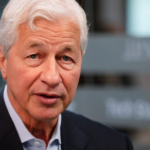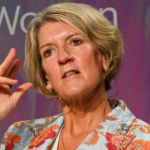As their heads were measured and fitted for custom-made, felt cowboy hats, the 100 or so guests assembled in Utah’s scenic Wasatch Mountains in November 2023 had ample reason to feel special. The group of AI executives, venture capitalists, government officials, and policy folks, had been handpicked to attend a secretive, three-day retreat focused on the national security implications of artificial intelligence.
Presiding over the confab was Alexandr Wang, the young CEO of data labeling AI startup Scale. Wang’s company was eight years old and already worth $13 billion at the time, but the event at the Montage Deer Valley, co-hosted with longtime Scale angel investor Nat Friedman, was clearly intended to signal Wang’s status as more than just the latest Silicon Valley wunderkind. Sitting alongside gray-haired Pentagon top brass, the 26-year-old Wang held forth on the U.S.-China AI arms race and other weighty topics.
One attendee recalled Wang as a well-spoken master of ceremonies, but with an agenda to sell. “My impression is that [it] was a bit of a sales event to show off to his investors and government customers that he had a fantastic network,” he told Fortune. Another attendee said Wang was a “generous” host, but added he was unsettled by the “theatrical hawkishness”—what he described as a “fairly transparent effort to ingratiate himself with the national security establishment.”
By then, however, it was clear: Wang, who was already known in some D.C. circles as Washington’s “AI whisperer,” had come a long way since co-founding Scale AI in 2016 with Lucy Guo, back when he was a 19-year-old MIT dropout building a data-labeling startup for self-driving cars (to help teach AI systems to know the difference between, say, a blowing plastic bag and a pedestrian).
Fortune spoke to more than more than a dozen people close to Wang, including current and former Scale employees, investors, acquaintances, and competitors, to trace how the 28-year-old MIT dropout built the business at the center of one of the richest deals in the AI boom, and to understand why Meta is betting so much on it. Meta declined to comment or to make Wang available.
“Alex is a great recruiter, a really savvy commercial person,” said one former Scale manager. “Who knows if it’ll work out? Maybe he builds a better AI team into something Herculean, maybe not, but you’re gonna bet on someone to do it. There’s probably a handful of people in the world that you bet on to do it. I think he’s probably one of them.”
Wang resisted Zuckerberg’s initial proposal that he join Meta, saying that if he were to leave his startup, any deal would have to involve an immediate (and worthwhile) outcome for Scale’s investors, according to the source familiar with the negotiations. Throughout May, the two CEOs held on-and-off discussions, going from a proposed $5 billion Meta non-voting investment in Scale to the eventual arrangement of Meta investing $14.3 billion for 49% of Scale in non-voting shares with potential future conversion. (The deal also includes a poison pill provision: If Wang leaves Meta, the shares would convert at a rate of 1.5, creating additional dilution, incentivizing Wang to make a long-term commitment to Meta.)
Some sources close to Wang, whose first name is spelled without the second “e” to give it the eight characters associated with good fortune in Chinese culture, said the deal he reached with Zuckerberg shows his commitment to doing right by his investors and employees rather than abandoning them for his own lucrative exit. Still, the news that Wang was leaving came as a big surprise to many people connected to Scale and its CEO.
After the deal was publicly announced, Wang addressed Scale employees at the company’s South of Market office in San Francisco. He got a standing ovation as he walked down a winding staircase to the office building’s atrium. He cried at times as he spoke to employees about his time at Scale and starting the company when he was a freshman at college.
Perhaps Wang was thinking even further back to his childhood, as the son of immigrant parents who were nuclear physicists at Los Alamos National Laboratory in New Mexico, which had served as the top-secret site for developing the first atomic bombs, led by J. Robert Oppenheimer.
“In my town, basically everybody’s parents worked for the National Lab,” he told Fortune in an interview last year. “Every adult around me was a scientist who had made the pledge to use their scientific capability and their powers for enhancing technologies that would ensure the continued security of the United States.”
That upbringing provided the template Wang used to make Scale into a successful business, said Jared Friedman, a group partner at Y Combinator. “He built an extremely talent-dense team and intense culture with people similar to him, other exceptional math and CS [computer science] students,” Friedman said.
“They were originally working on completely different ideas and spent most of the first summer just figuring out what to build,” recalls Friedman, who served as Wang and Guo’s partner at Y Combinator in 2016.
Once it pivoted to data labelling, Scale found the perfect customer base in the rapidly-expanding, and well-funded, group of startups working to build self-driving vehicles.
Wang embodied the company credo of “Ambition shapes reality,” said an early employee who left in 2022. “Alex himself would get deeply involved in customer engagements when needed, including deep-diving into both technical challenges and helping to network and negotiate with higher-ups on the business side to help us win customers and new business.”
Another source, the former Scale manager, described two-hour-long daily meetings “where we would review every single account.” The routine was not universally enjoyed inside the ranks, the person said, “but honestly, in retrospect it forced everyone to be very rigorous.”
Tensions between the two cofounders soon surfaced as the company grew. Guo had recruited Wang, and she was the original CEO. But the two founders could not get along, clashing over how they each deemed their counterpart was handling their duties, according to a source familiar with the matter. The board sided with Wang, who became CEO, and Guo left the company in 2018, according to this person’s account. Guo told Fortune that when Wang proposed taking on the CEO role after the Series A, believing “he’d be better as the face of an API company,” she agreed. “I wasn’t title centric and was fine with it,” she said in an email. Guo told Fortune she had received $750 million as a result of the Meta deal, but did not comment on the current state of her relationship with Wang.
In recent years, Scale has run into concerns about its labor practices with the estimated tens of thousands of contractors it employs around the world to manually label data and review images. A Department of Labor investigation was opened in 2024 and closed in May around the company’s adherence to the Fair Labor Standards Act, particularly around fair pay and worker classification. There are currently two labor lawsuits against Scale that are ongoing. Glenn Danas, partner at Clarkson Law Firm—which brought those cases against the company—estimates the company’s contractor workforce could be roughly 60,000 people.
One thing that makes the Meta/Scale deal notable is that Wang had always emphasized that he is not a researcher, and that Scale AI was not building AI models. Instead, it wanted to provide the entire generative AI ecosystem with high-quality data to train its models.
“We’re not out there developing a leading large language model,” Wang told Fortune last year. “But we do serve the entire ecosystem. Nearly every major large language model is built on top of our data foundry.”
Scale was also agnostic when it came to working with customers. It did some of the earliest experiments on reinforcement learning human feedback (RLHF), with OpenAI in 2019, with the team that later became Anthropic. Scale continued collaborating with both AI startups. “We’re both neutral across the entire ecosystem and we’re able to have very strong relations with every relevant company in the AI ecosystem across the stack,” Wang said.
But several industry insiders that Fortune spoke to were skeptical of the theory. Ryan Kolln, CEO of Scale AI competitor Appen, said he doubts the Meta/Scale deal is about consolidating data vendors or starving competitors seeking data. There’s a risk in doing that because there’s a strong benefit to having diversity in data, with vendors that have different specialties and expertise, he said.
So what is the key thing Zuckerberg is getting for his $14.3 billion?
Erik Meijer, a former engineering leader at Meta, said he would not be surprised by a move to make Wang a “chief AI officer” of all of Meta. “Heaping everything into a single org makes sense,” he said. “In fact I would be surprised if Mark [Zuckerberg] would make such a big investment and then not do a full on reorg putting all AI efforts in one place.”
That said, Wang would be an unorthodox choice for the top role, given that he is not a computer scientist. Whether the PhDs and other AI researchers working at Meta would accept Wang as their leader is hardly a sure thing. “Nope,” one current Meta AI researcher said flatly. Wang is a businessman without a strong record working with AI models, the Meta researcher said. A former Meta AI researcher who worked in Meta’s FAIR group concurred: “He is not going to be accepted easily.”
“We forget sometimes he is a very technically-capable guy,” said the former Scale manager. “He’s not just a salesperson. He’s incredible at it, but he’s not just a salesperson.”
With more than $164 billion in annual revenue, Meta knows all too well that it takes something truly unique to move the needle in its business. And in paying up for Wang and Scale, Zuckerberg is likely betting that the real value transcends any simple categories.
One source close to Wang told Fortune that the surprise and confusion stems from the fact that Wang does not fit into the typical tech world archetypes. “Silicon Valley is good at putting people into boxes, they like to say, this person is a technical person, this person is a business person,” he said. “Alex is truly a man of one.” And that kind of asset is especially valuable as the landscape changes.
“My very, very deep sense is that Meta is actively exploring, maybe even advanced in terms of actively exploring, wanting to play a significant leadership role in the national security of the United States,” said one former Department of Defense official.
“He’s been very smart and extremely clever,” the former DoD official said about Wang. “He seemed to lean into something that a lot of people have a little bit of a revulsion against, which is, engage in the politics of Washington. I think Alex, whether it’s by generation or personality, or whatever, he really got that that needed to happen – he seemed to have a real sixth sense.”
But while Meta could use all the help it can get in D.C. (“No one loves to hate anyone more than Washington loves to hate Zuckerberg; it’s kind of a pastime for some people,” a beltway insider said), Wang will ultimately need to deliver more than the services of a lobbyist for the partnership with Zuckerberg to be successful. To Wang’s fans, including one source who has known Wang for about a decade, his versatility will help Meta open doors and navigate whatever challenges lie ahead: “He’s better at the point of contact on any problem more than anyone I’ve ever seen.”









